We Use CookiesWe use cookies to enhance the security, performance,
functionality and for analytical and promotional activities. By continuing to browse this site you
are agreeing to our privacy policy
Best 2000 Watt Generators
From leading brands and best sellers available on the web.#2
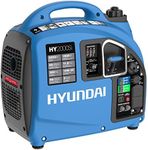
Hyundai
Hyundai HY2000si 2000-watt Portable Inverter Generator
View Product
#3
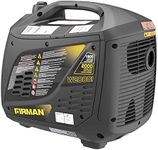
Firman
FIRMAN INVERTER GENERATOR 2000W PEAK/1600W RUN
View Product
#4
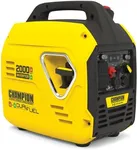
Champion Power Equipment
Champion Power Equipment 100900 2000-Watt Dual Fuel Inverter Generator, Ultralight
View Product
#5
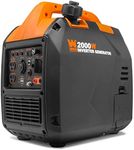
WEN
WEN 56203i Super Quiet 2000-Watt Portable Inverter Generator w/Fuel Shut Off, CARB Compliant, Black
View Product
#6
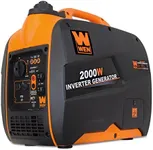
WEN
WEN 56200i 2000-Watt 79.7cc OHV 4-Stroke Gas-Powered Portable Inverter Generator, CARB Compliant
View Product
#7
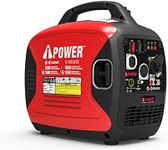
A-iPower
A-iPower SUA2000iD 2000 Watt Portable Inverter Generator Gas & Propane Powered, Small with Super Quiet Operation for Home, RV, or Emergency
View Product
Buying Guide for the Best 2000 Watt Generators
Choosing a 2000-watt generator can be a smart move if you need portable power for camping, tailgating, small appliances, or as a backup during outages. The key is to match the generator’s capabilities with your actual needs. Think about what you want to power, how often you’ll use the generator, and where you’ll use it. Understanding the main features and specifications will help you make a confident and informed decision.Wattage (Running and Starting)Wattage tells you how much power the generator can provide. There are two numbers: starting (surge) watts and running (rated) watts. Starting watts are the extra power needed to start appliances with motors, while running watts are what the generator can supply continuously. For a 2000-watt generator, running watts are usually around 1600-1800, with starting watts peaking at 2000. To pick the right one, add up the running wattage of all devices you want to use at the same time, and make sure the generator’s starting wattage covers the highest initial surge. If you only need to power a few small items, a 2000-watt generator is often enough.
Portability (Weight and Size)Portability refers to how easy it is to move and transport the generator. Lighter and more compact models are easier to carry, especially if you plan to use the generator for camping or outdoor events. Generators in this class typically weigh between 35 and 55 pounds. If you’ll be moving it often or lifting it by yourself, look for a lighter model with a comfortable handle. If it will mostly stay in one place, weight may be less important.
Noise LevelNoise level is measured in decibels (dB) and tells you how loud the generator will be when running. Quieter generators are better for camping, RVs, or neighborhoods where noise could be an issue. Most 2000-watt generators range from about 50 to 65 dB at a standard distance. If you value peace and quiet, look for models on the lower end of this range. If noise isn’t a concern, this spec may be less important.
Fuel Type and Run TimeMost 2000-watt generators run on gasoline, but some can use propane or even dual fuel. Run time tells you how long the generator can operate on a full tank at a certain load (often 25% or 50%). Longer run times mean fewer refueling stops, which is handy for overnight use or during long outages. If you need the generator to run for many hours without interruption, look for a model with a larger tank or more efficient engine.
Outlets and ConnectivityThe types and number of outlets determine what you can plug in. Common options include standard household outlets, USB ports, and sometimes RV or 12V DC outlets. Think about what devices you’ll need to power and make sure the generator has the right outlets. If you want to charge phones or run sensitive electronics, look for models with USB ports or inverter technology for clean power.
Inverter TechnologyInverter generators produce cleaner, more stable electricity, which is safer for sensitive electronics like laptops and phones. They are also usually quieter and more fuel-efficient. If you plan to power electronics or want a quieter, more efficient generator, choose one with inverter technology. If you only need to run basic tools or appliances, this may be less critical.
Parallel CapabilityParallel capability means you can connect two compatible generators together to double your power output. This is useful if you might need more power in the future but want to start with a smaller, lighter unit. If you think your power needs might grow, or you want flexibility, look for a generator with this feature.
